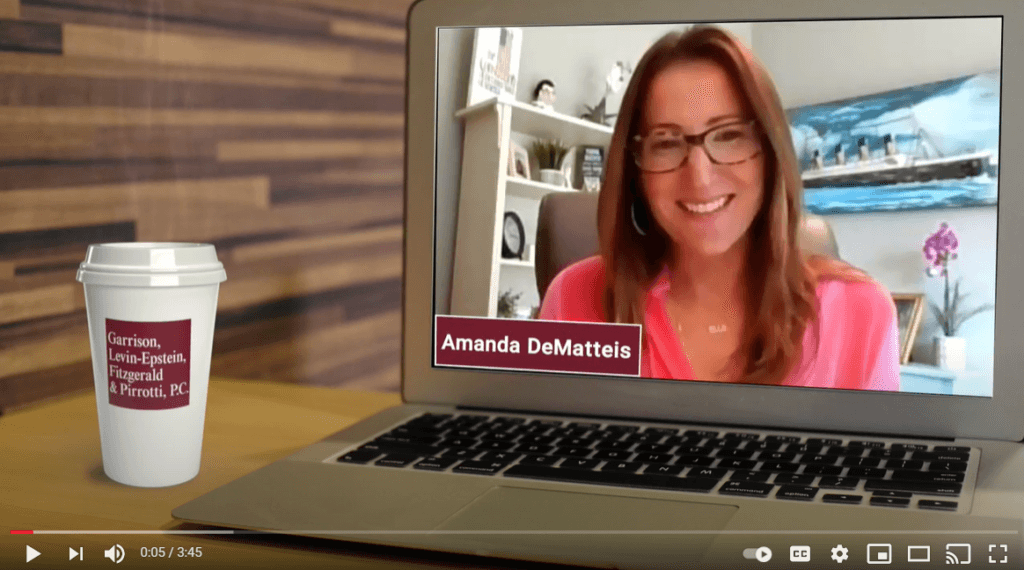Josh Goodbaum: Hi, Amanda.
Amanda DeMatteis: What are we going to talk about today?
Goodbaum: I think we can talk about workers’ compensation and in particular, the employment status of employees who are trying to get workers’ compensation. A common scenario – an employee comes to us, they got hurt on the job, they’re seeking benefits, or they’re getting benefits, through the workers’ compensation system and now they’re having issues with their employment. Maybe they’ve been on light duty, maybe they’ve been out of work and the employer either fires them out of the blue, or the employer says, “Hey, you got to come back to work full-time, full-duty, or you’re not going to have a job here anymore.” What do we tell those people?
DeMatteis: Yeah, this is critically important. So, what we tell them is Connecticut state law prohibits discrimination or discharge on account of a workers’ compensation case, and what does a workers’ compensation case mean? It means any benefit that a Connecticut employee seeks under our workers’ compensation statute. That could be simply filing a first report of injury, it could be seeking medical attention under the act, or taking time off, getting medical treatment, etc. There are a number of different things that we can do to exercise our rights under the workers’ compensation statutes here in Connecticut. Your employer may not discharge or discriminate against you on the basis of you doing that. So, again, it’s very fact specific here, right, so you have to look at all the facts surrounding your employment relationship, but as a really quick hypothetical: Say you’re a 10-year employee, things are going really well at work, all of a sudden you get hurt. You injure your back, you’re out getting surgery, and at some point close in time to that, your employer is now threatening to terminate you. You may want to step back here and say, “Hey, wait a minute, what’s really motivating this decision to terminate me?” Maybe that means having a conversation with one of us over here at Garrison, Levin-Epstein, but it’s important that you know your rights here. It’s important to know that you can’t be discriminated [against] or discharged because you’ve sought rights under our Connecticut Workers’ Compensation Act. There’s another really important distinction. Of course, the Workers’ Compensation Commission has exclusive jurisdiction over workers’ compensation cases, except for this specific statute that I’m referring to. We have the ability to take these cases –
Goodbaum: That’s 31-290a right?
DeMatteis: Yeah, that’s right, it’s Section 31-290a under our Connecticut General Statutes. You have the option, Connecticut employees have the option to bring that claim either in the Commission or in Superior Court in Connecticut, which allows different damages than the Worker’s Compensation Commission does. It’s important to know, of course, that you have these rights under Connecticut law. There are a couple of different options in terms of where you bring them, if you find yourself with a workers’ compensation injury and then shortly thereafter out of a job, it may be worth exploring your rights and seeing whether that termination was legal.
Goodbaum: Yeah, I’ll just add one more note here, which is workers’ compensation retaliation cases are particularly complicated because of the interaction between the workers’ comp system, FMLA, that is Family and Medical Leave Act, and the Americans with Disabilities Act, because the ADA entitles you to an accommodation, FMLA entitles you to a certain amount of leave, the workers’ compensation system entitles you to benefits, and those three things can sort of work in tandem or in conjunction to provide you with a number of benefits that often can be really difficult to understand if you’re just a worker who got hurt on the job and you want to make sure that once you’re healed, the job is there for you when you get back. So, important to consult with an employment lawyer if you have questions about this or start by asking your workers’ compensation lawyer, if you have one, to help you understand how you can make sure that you keep your job. Hope that’s helpful for everybody.
DeMatteis: Thank you, take care.

